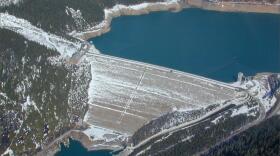-
(Runtime 0:55 ) The Columbia River Treaty — and what will happen next between Canadian and U.S. governments — has been the talk of the town in British…
-
(Runtime 1:04) The U.S. and Canada are working out key details of the Columbia River Treaty. That important agreement details flood risk management along…
-
(Runtime 1:01) After more than six years of difficult negotiations, the U.S. and Canada have figured out some key points of the Columbia River Treaty, a…
-
Salmon advocates want negotiators to consider salmon and the Columbia River’s ecosystem as a part of an agreement between the U.S. and Canada.
-
The Columbia River Treaty is costing U.S. ratepayers and public utility districts too much. That was the broad sentiment at a sometimes-tense town hall Monday about ongoing treaty negotiations. At the Richland meeting Monday night, negotiating officials laid out the complicated back-and-forth between the U.S. and Canada.
-
Peter Marbach says he wanted to use his photography to tell the story of the Columbia River, to move from purely landscape images to a more social justice-driven book. To do that, he needed help -- from the First Nations communities most affected by the development of dams along the river.
-
The U.S. State Department will host a town hall meeting in Portland Thursday, Sept. 6, on the renegotiation of the Columbia River Treaty.
-
The U.S. and Canadian governments have scheduled a second and third round of negotiations to modernize the Columbia River Treaty. The 54-year-old treaty provides flood protection to Portland and smoothes out Northwest hydropower production.
-
The first round of talks to modernize the U.S.-Canada Columbia River Treaty took place this week. Officials from the U.S. negotiating team briefed reporters on Thursday on progress at the talks, which are aimed at revising the 54-year-old agreement which governs hydropower and flood control along the Columbia River.
-
The United States and Canada next week will begin the official process of renegotiating the Columbia River Treaty, which expires in 2024. The 1964 agreement governs the upper reaches of the 1,200-mile Columbia River.
Play Live Radio
Next Up:
0:00
0:00
Available On Air Stations








